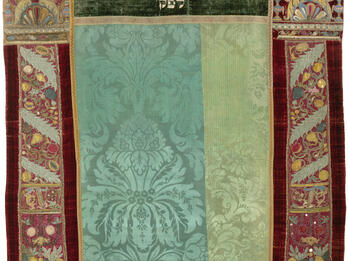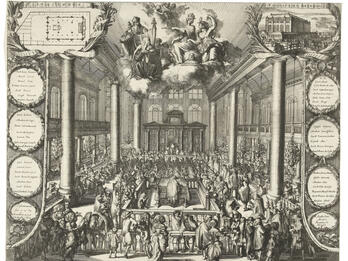Rulings
And now, you, my brethren, my people of holy communities in all the places you live, for several years I have been unable to send you reproaches and words of ethics and righteousness. . . . And since I know that there are righteous men among you, . . . and there are also hard men among you, who do not heed the words of judges, and do not wish to hear reproaches, and will not heed those zealous ones who clear the thorns from the vineyard of the Lord of Hosts [see Isaiah 5:7] . . . the adulterers, and the robbers, who consume the money of Israel, and who rebel against the community . . . and similarly, they should investigate to make sure there is no informer in the community, who will tell tales and reveal the secrets of the congregation to the gentiles; he should be expelled from the community. The community must not split into diverse factions so no person separates himself from the troubles of the community.
I have also decreed that women shall not receive betrothals until the night of their entrance to the bridal canopy, . . . and men shall not take a wife against her will and the will of her father and mother and brothers and relatives. . . .
I have also decreed that the congregation must not be divided into many parties and groups. If anyone rebels against the community, the whole congregation should rise up against him to bring him down and humiliate him. Likewise, any student who has been appointed to perform ritual slaughter may not slaughter by himself until experts have examined him in his slaughtering for at least six months. . . .
I will also ban and excommunicate anyone who eats the cheese of gentiles or drinks the wine or liquor of gentiles or roasted eggs of gentiles. The same applies to anyone who goes to a gentile court without the permission of the congregation.
I also have condemned anyone who speaks ill of his fellow Jew. . . .
I have also decreed against a student who belittles his master’s honor and slaughters without his master’s permission. An unworthy cantor or slaughterer should not be appointed when an honest slaughterer or cantor is available. . . .
I have also decreed that the officer should take dues from the poor as from the rich. . . .
I have also decreed against anyone who strikes his fellow or informs against him, even if the latter has done something bad to him. Rather, he should consult the rabbinic court and obtain their permission, and they will pass judgment on him . . . and they will give those who reprimand the authority to reprimand him and the preachers to preach against him. . . .
I have also decreed against anyone who has a son but does not send him to school, or to someone who has no son and does not support the school, or to anyone who fails to come to prayers. . . .
I have also decreed that the communities must honor Torah scholars. . . .
And I have also decreed that no judgment shall be passed against Torah scholars . . . without consulting the elders who take care of the needs of the synagogue and the community . . . their relatives and those who are useful to them shall not be flattered . . . and Torah scholars who are useful to the community will be exempt from taxes and dues. And it is permitted to kill an informer and physically destroy him.
Credits
Published in: The Posen Library of Jewish Culture and Civilization, vol. 5.





